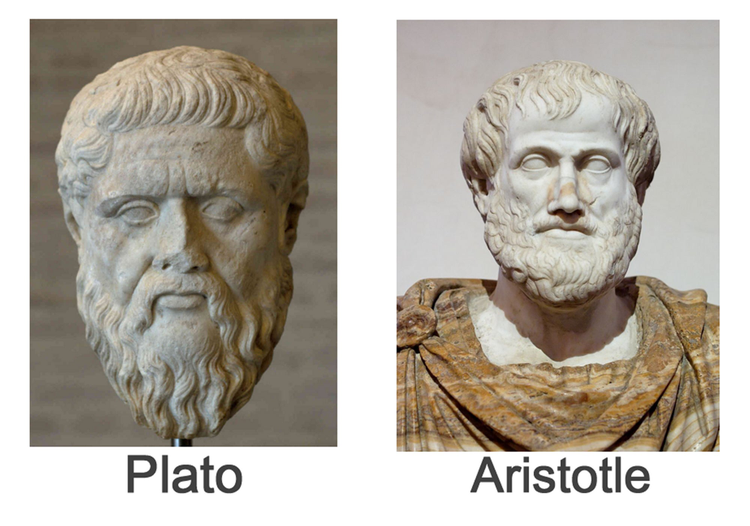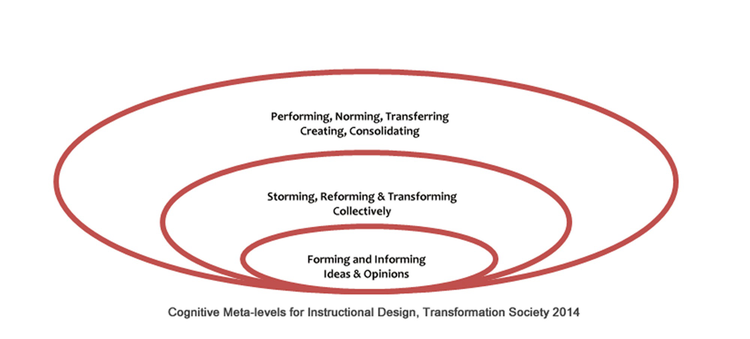[Guest Post] “Digital Learning: Individual Adaptive Construction or Connected Social Interaction?”, by Ray Gallon & Neus Lorenzo
Editor’s Note: this blog is posted in anticipation of an immersive, highly participative eSeminar on December 4th, Sess 4) Digital Learning: Individual Adaptive Construction or Connected Social Interaction?
In the digital era, are we more adapted to Plato or to Aristotle?
Plato learned and taught through written simulated dialogues, a type of reasoning based on logic and intuition. Aristotle and his followers used to walk around while thinking and debating together.

Figure 1: Plato and Aristotle
In a changing global economy where managing digital reality is essential, what’s more useful?
- Individual training to achieve competitive levels of strategic learning and outstanding knowledge?
- Social education to develop collaborative skills for innovative networking, creative thinking and team production?
Individual needs versus collective interest: it’s an old debate, isn’t it?
In a world where attaining one’s best is the path to social success, personal reflective learning is essential for individual performance. On the other hand, when new lines of thought are needed to find creative solutions to emergent and unexpected challenges, collective knowledge building is indispensable.
Education has always been a mechanism to assure two functions:
- The empowerment of new generations to ensure their individual survival
- The instructional transmission of collective beliefs to guarantee the adaptation and change that enables cultural continuity.
How does Digital Learning merge individual and social components?
What educational programmes need to be developed to encourage both personal success and social construction?
Link to our website and take our survey, then join us to participate in a webinar on December 4th to debate this topic.
What does Learning Mean?
Historically, children imitated adults and beginners copied experts, and for many centuries, learning has meant the reproduction of an existing model through the accumulation of knowledge, seen as “the truth”[i]. This traditional instructional model requires the student to have a receptive, disciplined attitude, with attention to minute detail in reproducing final results. Memory and concentration was essential.
In the last 200 years, in the Western world, industrial society has demanded that learning become the acquisition of learning habits, expert knowledge and accurate performance in several atomized domains. This model promotes standardisation, and generates an extremely individualist concept of success. A good student challenges himself and competes with others, to reach the top of an identified learning process.
In the last 20 years, the explosion of communication technologies across the planet has meant that all educational systems have had to face growing demand for learning processes based on interactive skills, collaborative competencies, and networking abilities. The need for creative ideas and divergent solutions demands individual responses and diversity. Every individual strength can be seen as a possibility. The context for formal education is now based on social knowledge-building and enriched collective research. Theoretical constructs for both individual cognitive development and connective community building have become essential.
Today, learning does not mean to acquire the codified knowledge that a teacher has consolidated and transmits in class. Rather, it means to explore and discover individual strategies and collective tools for building creative solutions together. As John Dewey said in 1915[ii],
“There are too many urgent demands in the present, too many calls over the threshold of the future, to permit the child to become deeply immersed in what is forever gone by.”
What does Digital Learning Mean?
Digital Learning is the application of information and communication technologies to enhance learning techniques that empower both personal discovery and cooperative interaction. It generally implies technical mediation, and it is called e-learning when it includes the idea of electronic distance education. Bernard Luskin, one of the pioneers of e-learning, defends that the initial “e” should also be interpreted to mean “exciting, energetic, enthusiastic, emotional, extended, excellent, and educational” in addition to “electronic.”[iii]
Now that non formal education and lifelong learning are even more important than initial instruction, digital learning opens a whole new educational paradigm of flexibility and fluidity of:
- Time: Internet connections generate simultaneity or time shifted processes.
- Place: Learn anywhere and everywhere.
- Path: Interactive and adaptive software adjusts content to meet the unique needs of each student.
- Pace: Adjusts rhythm and intensity of learning to each student or group.
The use of digital learning tools that place isolated students in front of drilling activities for acquiring singular abilities does not guaranty the social learning that is needed today. How can we use digital learning tools in a more effective way? How can we complement formal and non-formal learning environments?
Henry Jenkins, professor at the USC Annenberg School of Communications, has extensively studied how society is evolving with media and technology. He suggests that current educational styles are not equipping learners with 21st century skills:
“Right now, schools are still training autonomous problem-solvers, whereas as students enter the workplace, they are increasingly being asked to work in teams, drawing on different sets of expertise, and collaborating to solve problems.”[iv]
Connecting learners with each other and enabling them to participate in real situations where problem solving and mutual support are essential, contributes to what Jenkins calls participatory culture.
- Are simulation and gamification the new environments for training programmes?
- Are massive collective courses effective opportunities for open access to knowledge, practice, and research in the digital world?
- Is virtual reality a future platform for schooling, vocational, and in-service training?
- How can society manage the big data derived from MOOC’s (Massive Open Online Courses) and personal learning environments, to encourage equity without falling into a low-cost model for university studies?
- What can augmented reality offer to increase the effectiveness of teaching and learning processes in a connected Internet of Everything?
Are we ready to explore the educational aspects of the Internet of Things, Augmented Reality, Human Bionics, and other related emerging concepts?
Instructional Design for Inquiring Minds
In a global village, what is the best instructional design to encourage the spirit of inquiry that will engage and connect with others?
Research by the French Viavoice polling institute[v] shows that the millenial generation bases its ideas of value in the notion of respect for the singularity of each person. To obtain the greatest potential from this diversity while attaining common objectives, individual talents need to find their channels and empowerment by working together. Collective performance and collaborative production do not result in a gray, homogenized mass, but a multicoloured mosaic that contributes to the whole.
Are we lacking knowledge, practice, or will to do this?
Is the focus on following external methodologies, or on being engaged in participatory processes?
Any instructional design for digital learning should take into account the need to offer three meta-levels of action:
- Open spaces for expressing individual ideas and opinions about themes and processes (forming ideas through information gathering)
- Interactive platforms for sharing and exchanging ideas with other people and with experts to reflect, reframe, and transform the initial ideas (with adequate tools, strategies, techniques)
- Proactive aims for creating and consolidating common projects (pursuing inclusive participation and international networking).
These three meta-levels define a process that helps the learner develop an inquiring mind, in order to transcend from initial data gathering, into information sharing and collaborative knowledge building (see Figure 2).

Figure 2: Cognitive Meta-levels for Instructional Design, Transformation Society 2014
Learners’ Responsibility
Learning in a complex system implies more than awareness of the singular needs of each actor (teacher or learner). It also implies creating a social situation where interaction adds value and meaning beyond what each participant can learn on their own. This added value and meaning is acquired only when every participant takes responsibility for managing the relationships, dependencies, and emotional forces that influence collaboration.
- Do digital learning environments facilitate the kind of consciousness-raising needed to transcend personal interests?
- Will this happen on its own, or only in specific contexts?
- Should it be encouraged by institutions, organizations or industries?
- Should this leadership be assigned to a specific profile or profession? What sort of skills do they need?
The New Literacy
Leading and managing digital learning requires specific profiles to encourage interactions and transfer across different media.
This means mastering not only the traditional reading, writing, speaking, listening and debating skills, but being able to face the new literacy of the 21st century, referred to as “transliteracy.” In digital environments, this means “the ability to read, write and interact across a range of platforms, tools and media from signing and orality through handwriting, print, TV, radio and film, to digital social networks.”[vi]
And in different languages!
Transliteracy is embedded in the very notion of digital learning. It refers to structures, concepts, and tools, that are developed in virtual communities.
Are communities defined by the social media platform that hosts them, or by their common purposes?
The Organization for Economic Cooperation and Development (OECD) has identified the ability to solve problems collectively as a major objective for the next round of PISA evaluations in 2015. The OECD considers that students entering higher education should be proficient in:
- Establishing and maintaining shared understanding
- Taking appropriate action to solve problems
- Establishing and maintaining team organization[vii]
If a global economic organization expects 15-year-olds to develop these skills, it’s because they believe that adults today are hardly competent without them.
Can we develop digital learning strategies to meet their expectations?
Our Webinar on December 4th will be an opportunity to exchange further thought and deeper ideas. Answer our survey and join us!
- [i] Aristotle, “Metaphysics,” Book II, I-II-III, 983b-995a. http://www.filosofia.org/cla/ari/azc10089.htm
- [ii] Dewey, John (1915) “The School and Social Progress.” Chapter 8, p.155, in The School and Society (Revised edition). Chicago: University of Chicago Press
- [iii] Wikipedia, “eLearning”, http://en.wikipedia.org/wiki/E-learning
- [iv] Jenkins. Henry (2009), “The Challenge of Participatory Culture,” MIT Press
- [v] Miquet-Marty, François (2013), “Les nouvelles passions françaises,” Michalon
- [vi] Thomas, Sue, et al (2007), “Transliteracy: Crossing Divides,” in First Monday, Volume 12 Number 12, http://journals.uic.edu/ojs/index.php/fm/article/view/2060/1908#author
- [vii] OECD (2013). Innovative Learning Environments. Paris: OCDE.
http://dx.doi.org/10.1787/9789264203488-en